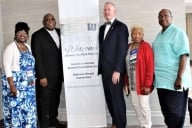You have /5 articles left.
Sign up for a free account or log in.
Officials at the Distance Education and Training Council, a Washington-based accrediting body, woke up Monday morning to find that the agency had acquired an unwelcome twin overseas.
The body was tipped off to the existence of a Web site for an organization with the same name, with a British Web domain and a Cyprus address, that claims to be “the leading global membership organization for the open and distance education community.”
The Washington-based council believes the organization to be an accreditation mill -- a phony accrediting body designed to lend a veneer of legitimacy to bogus institutions. The executive director of the established Washington council, Michael Lambert, said he sent out messages to its members shortly after learning of the Web site. Lambert also wrote to contacts abroad, one of whom responded to say that a search of a public database revealed no record of a company registered in Britain under the borrowed name.
Attempts to reach the keepers of the site using the contact information provided were unsuccessful; the phone number was nonworking, and a message sent to the e-mail address was not immediately returned.
In addition to the site's bearing the Distance Education and Training Council’s name, its "standards" section is a verbatim copy of the equivalent section on the Web site of another U.S. accrediting body, the New England Association of Schools and Colleges. In an interview with Inside Higher Ed, association director Barbara E. Brittingham said it was the first she had heard of the plagiarism, but that her next call would be to the association’s lawyer.
But at a time when the online education industry is growing rapidly and online institutions are attracting students from countries all over the world, the mechanisms for cracking down on accreditation mills and their diploma-granting cousins -- particularly operations that transcend international borders -- remain weak.
Lambert is not holding out much hope that the people behind his organization’s imitator will be caught, or even identified. This would be the third time in a decade that an accreditation mill has tried to trade on the council’s name, he said, and despite the due diligence paid by state authorities in the previous two cases -- one site was traced to an address in Nevada, the other in Maryland -- neither effort identified the perpetrators.
“Usually what happens is people say, ‘We can’t find them,’ or ‘We don’t know where they are,’ ” Lambert said, adding that those two sites eventually “just went away.”
That the present case appears to have originated in Cyprus, the Mediterranean island nation, poses a whole new set of problems, Lambert said. Foreign authorities have little incentive to follow up on such complaints, he said, and foreign plagiarists are not as easily dissuaded by threats of litigation from an American institution — that is, assuming the cease-and-desist warning even reaches them.
“Any action to close such an operator down at our end would be very difficult,” a British trade expert wrote in an e-mail to Lambert, which Lambert forwarded to Inside Higher Ed. “Trading Standards (our local authority run consumer protection agency) would enforce where misleading advertising or unfair commercial practice was concerned but would need a UK address and post code to work with.”
“That leaves an alternative course which would be seek legal action for a suspected breach of your organization's own intellectual property,” the expert added. “Only problem is all you have to go on is the address in Cyprus for any lawyers to write to.”
The Council for Higher Education Accreditation, or CHEA, recently helped write a bill called the Diploma and Accreditation Integrity Protection Act, which was introduced in the U.S. House of Representatives earlier this year. The bill defines diploma and accreditation mills, tells the Federal Trade Commission to intervene and notify the Education Department of such sham operations. But even if it is passed the bill would have no international teeth. Explicitly intended to guard against fraudulent degrees held by citizens applying for federal government jobs, the best it could do would be to provide a “blueprint” for similar laws to be passed elsewhere, said a CHEA spokesman. The council is not aware of any countries currently moving to crack down on accreditation mills, he said.
That bodes poorly for those who may be most vulnerable to the subterfuge of accreditation- and diploma-mill peddlers: foreign students.
“Accreditation is unique to the U.S., and it’s not easy for [foreign students] to distinguish a recognized accreditor from a fly-by-night accreditor,” Lambert said. “…I think U.S. folks aren’t as easily fooled by this sort of thing, but some folks around the world might think this is a legit operation.”
Brittingham agreed, adding that “anybody who doesn’t have family background experience in the higher-education system is probably disadvantaged.” She said her accrediting body had fielded calls from people asking whether the Massachusetts Institute of Technology was accredited, among many other institutions. And “when you get beyond the borders of the U.S. it gets even more challenging for people to figure out,” she said.








